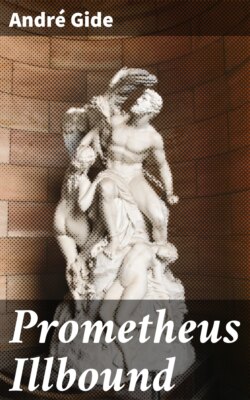Читать книгу Prometheus Illbound - Андре Жид - Страница 3
На сайте Литреса книга снята с продажи.
PREFACE
ОглавлениеTable of Contents
The work of art is the exaggeration of an idea, says Gide in the epilogue of the “Prometheus Illbound.” This is really the explanation of the whole book and of many other books of Gide.
His world is a world of abstract ideas, under the action of which most of his characters move as marionettes. “Time and space are the boards, which, with the help of our minds, have been set up by the innumerable truths of the universe as a stage for their own performances. And there we play our parts like determined, convinced, devoted and voluptuous marionettes.”
That is the reason why there is a determinist atmosphere in his books and that even the disinterested act appears as the reaction of the mind on its own concept. Zeus, the banker, poses this disinterested act because his thought refuses or hesitates to admit it; the same thing happens with Lafcadio in the “Caves du Vatican” when he is on the point of murdering Amédée Fleurissoire.
The tyranny of ideas is the dominating force of his characters. Even his first writings—where one finds some of his best pages, which appear to be purely lyrical explosion—such as “Les Nourritures Terrestres” and “Le Voyage d’Urien,” are really the songs of a mind which leads its life by the concept of eternal desire and detachment—a mind very near that of Nietzsche.
It is because of that tyranny of ideas that Gide is attracted by religious psychology. After all, Alissa of “La Porte Étroite” sacrifices her life and her happiness to her ideas. It is because of that also that one of the most daring books of the time, “L’Immoraliste,” is written in the most moral way: the feelings are only described by their reaction on the brain. And this applies to nearly the whole work of Gide.
Even his concept of heroism is ruled by it. His heroes are monomaniacs of a thought which they believe or create ideal. His “Roi Candaule” is a man stupefied by the idea of his possessions.
That which does not nourish his brain is a reason for depression, and as love or passion absorbs the brain without nourishing it, he resents it. Every attempt of a purely amorous adventure is a failure, as well in “L’Immoraliste” as in the “Tentative Amoureuse.”
On the contrary, when it becomes by struggle a problem for the brain it excites him. Alissa was really his only love, and he could not love Isabelle when she had lost her power of attraction through the revelation of the unknown she represented to his mind.
The exaltation of Gide is a Nietzschean exaltation—it is an exaltation caused by the power of mind.
The definition of genius he gives in “Prétextes” is very characteristic from that point of view. He calls it: “Le sentiment de la ressource.”
His sensitiveness is the sensitiveness of the brain, which is so acute that it vibrates through his whole personality. From there comes the clear, logical form of his tales.
The book, “Prometheus Illbound,” which we present to the English public to-day is one of the most characteristic books of Gide: a work of pure intellectual fantasy, where the subtle brain of the author has full play. It is the expression of the humorous side of a mind which must be ranked among the greatest of the world’s literature.
LILIAN ROTHERMERE.
PROMETHEUS
ILLBOUND
Eagle, vulture or dove.
Victor Hugo.
In the month of May 189..., at two o’clock in the afternoon, this occurred which might appear strange:
On the boulevard leading from the Madeleine to the Opéra, a stout gentleman of middle age, with nothing remarkable about him but uncommon corpulence, was approached by a thin gentleman, who smilingly, thinking no harm, we believe, gave him back a handkerchief that he had just dropped. The corpulent gentleman thanked him briefly and was going his way when he suddenly leant towards the thin man and must have asked for information, which must have been given, for he produced from his pocket a portable inkpot and pens, which without more ado he handed to the thin gentleman, and also an envelope which up to this minute he had been holding in his hand. And those who passed could see the thin man writing an address upon it.—But here begins the strange part of the story, which no newspaper, however, reported: the thin gentleman, after having given back the pen and the envelope, had not even the time to smile adieu when the fat gentleman, in form of thanks, abruptly struck him on the face, then jumped in a cab and disappeared, before any of the spectators, stupefied with surprise (I was there), thought of stopping him.
I have been told since that it was Zeus, the banker.
The thin gentleman, visibly upset by the attentions of the crowd, insisted that he had hardly felt the blow, notwithstanding that the blood poured out of his nose and his cut-open lip. He begged them to be kind enough to leave him alone, and the crowd, on his insistence, slowly dispersed. Thus the reader will allow us to leave at present some one he will hear of sufficiently later on.
